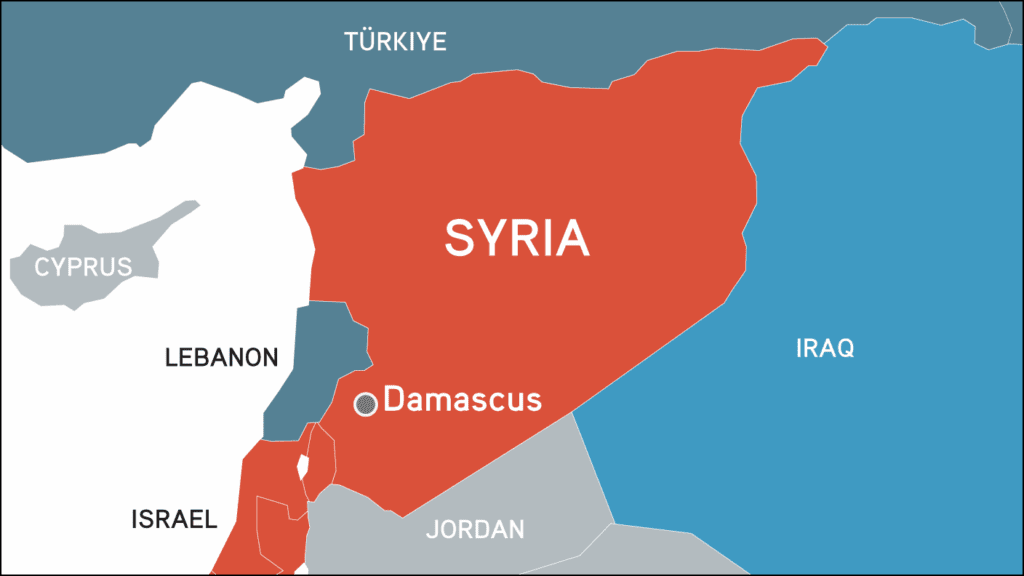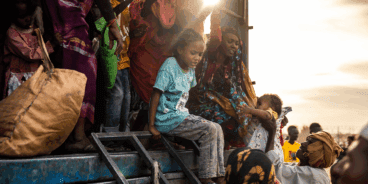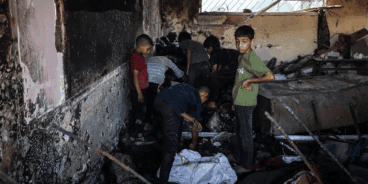Syria

Despite a political transition and significant decrease in hostilities, populations in Syria remain at risk of war crimes.
BACKGROUND:
On 8 December 2024 the government of President Bashar al-Assad was overthrown by a coalition of armed opposition groups, led by Hay’at Tahrir al-Sham (HTS), following a 12-day offensive. The collapse of Assad’s government occurred after nearly 14 years of an internationalized country-wide armed conflict between the government and opposition groups characterized by rampant atrocity crimes. More than 580,000 people were killed and 13 million Syrians forcibly displaced during the first 10 years of the conflict, according to the UN Human Rights Council-mandated Commission of Inquiry (CoI) on Syria. Over 500,000 Syrian refugees have returned to the country since December 2024, according to the UN Refugee Agency. Despite the overthrow of Assad, hostilities between the Syrian National Army (SNA), Syrian Defense Forces (SDF) and various armed groups continue in northern Syria, and in southern Syria between Druze and Bedouin armed groups.
The conflict has its origins in the Assad government’s brutal suppression of pro-democracy protests in March 2011. Throughout the armed conflict, the Assad government systematically perpetrated extermination, murder, arbitrary detention, enforced disappearance, torture and ill-treatment and sexual violence, amounting to war crimes and crimes against humanity, according to the CoI. Armed groups, including HTS, the SNA, Turkish-backed groups and the so-called Islamic State of Iraq and the Levant (ISIL), were also implicated in atrocity crimes, such as torture, ill-treatment, systematic looting and arbitrary detention. During the conflict, both the Assad government and ISIL employed the use of chemical weapons, with most attacks attributed to the government.
The CoI reported over 130,000 arbitrary detentions, abductions or disappearances since 2011, with the majority attributable to the Assad government. Following the collapse of the Assad government, HTS and other groups opened many state-run detention and prison facilities, including the notorious Sednaya prison. While thousands of people were released from arbitrary detention, a number of mass graves were discovered and many Syrians continue to search for missing relatives.
Tens of thousands of people with alleged affiliations to ISIL, mainly women and children, remain trapped in squalid detention camps run by the Kurdish-backed SDF. The CoI has reported that the conditions, particularly at al-Hol and Roj camps, may amount to cruel or inhuman treatment and may constitute the war crime of outrage upon personal dignity.
During the conflict, the UN Security Council (UNSC) failed to hold perpetrators accountable. Despite this, several processes were initiated to pursue truth, justice and accountability for Syrians. In December 2016 the UN General Assembly (UNGA) established an International, Impartial and Independent Mechanism to assist in the investigation and prosecution of perpetrators of atrocities in Syria. Several countries have initiated proceedings or convicted suspected Syrian perpetrators under universal jurisdiction. In June 2023 the UNGA established the Independent Institution on Missing Persons in Syria to clarify the fate and whereabouts of all missing persons and provide support to victims, survivors and their families. That same month, Canada and the Netherlands jointly initiated proceedings against Syria before the International Court of Justice concerning alleged violations of the Convention against Torture and Other Cruel, Inhuman or Degrading Treatment or Punishment.
RECENT DEVELOPMENTS:
Between 6 to 9 March 2025 armed clashes erupted in coastal areas, including Latakia, Hama and Tartus after armed groups and individuals loyal to former President Assad ambushed transitional government forces conducting a so-called “security campaign.” More than 1,000 people were killed, mostly from the Alawite minority group, who were reportedly specifically targeted. The CoI found that forces of the interim government, remnants loyal to the Assad government and private individuals were responsible for grave acts that may amount to war crimes, including murder, torture and abductions.
In late April sectarian violence erupted in southern Damascus, resulting in the killing of dozens of members of the Druze minority. In late June at least 25 people were killed and over 60 more injured by a suicide bombing at the St. Elias Church in Damascus.
Since December 2024 Syria’s transitional authorities have taken steps to dissolve remnants of Assad’s government. These include hosting a National Dialogue Conference, adopting a Constitutional Declaration to guide a five-year transition period until elections take place, appointing a new transitional government led by President Ahmed al-Sharaa and conducting parliamentary elections. Several armed groups have agreed to disband and integrate under the Ministry of Defence. On 17 May Syria’s transitional authorities announced the forthcoming establishment of a Transitional Justice Commission and a National Commission for the Missing.
Following the stalled implementation of a March ceasefire and reintegration deal and intensified clashes in Aleppo, the SDF and interim government agreed on 7 October to a renewed, comprehensive ceasefire in northern and northeastern Syria and to complete SDF integration into Syria’s new army by the end of the year.
On 7 November the Office of the UN High Commissioner for Human Rights expressed concern over reports of ongoing abductions and enforced disappearances after documenting nearly 100 cases since January 2025.
Since the fall of the Assad government, the international community has taken some steps to normalize relations with Syria. During May the European Union and the United States both announced plans to begin lifting sanctions on Syria. On 6 November the UNSC lifted terror-related sanctions on interim President al-Sharaa and Interior Minister and Interior Minister Anas Khattab.
ANALYSIS:
While the ongoing political transition is a historic opportunity for Syrians to rebuild their country, the future remains uncertain. Despite the collapse of the Assad government, rights abuses continue, including torture and enforced disappearances.
The transitional government must balance the urgency of rebuilding and restoring services with the need to address and remedy a legacy of serious human rights violations and atrocity crimes. The enactment of broad presidential powers under the Constitutional Declaration and absence of political pluralism has raised concerns over the interim government’s intention to promote a new political order that derives legitimacy from its diversity and inclusivity.
Although the creation of a transitional justice authority has marked a key step towards establishing a justice process, it has excluded accountability for crimes committed by non-state armed actors and has conducted limited consultations with Syrian civil society.
Minorities across Syria’s governorates are at risk of targeted attacks, while hate speech is on the rise. It remains to be seen whether the recent agreement between the transitional authorities and SDF can ensure a sustained ceasefire, including in the northeast, where hostilities between the SDF, SNA and other groups have displaced and endangered thousands of civilians.
RISK ASSESSMENT:
-
-
- Legacy of war crimes and crimes against humanity perpetrated by all parties to the conflict, particularly the former government.
- Impunity enjoyed by all perpetrators for atrocity crimes.
- Insecurity due to ongoing hostilities in northern Syria and escalating attacks against minorities.
- Weak institutions and economic devastation.
- Fragile political and security conditions following an abrupt change in political power.
-
NECESSARY ACTION:
The international community should support the transitional government in ensuring a transparent, diverse and inclusive political process, while also continuing to monitor the human rights situation in Syria. Efforts to build national unity must be grounded in Syria’s political, ethnic and religious diversity, including protective provisions in the drafting of the permanent constitution. Executive power afforded to the interim president must not be abused, nor exceed the transitional period.
All parties to the conflict must uphold their obligations under international law, including ending attacks on civilians and civilian infrastructure and facilitating unimpeded humanitarian access to civilians. The transitional authorities must take decisive measures to curtail hate speech and dis-/mis-information campaigns. They must prioritize the protection of all Syrians and uphold guarantees of non-recurrence, including through ensuring that interim security forces receive training in international human rights standards and are held accountable when responsible for violations. The return of refugees and other displaced Syrians must be in accordance with the principle of non-refoulement.
Syria should ratify the Rome Statute of the International Criminal Court, pursue justice and accountability, ensure the implementation of a comprehensive and holistic transitional justice process and maintain cooperation with all UN-mandated investigative mechanisms. The transitional justice commission must ensure ongoing consultation with and inclusion of civil society organizations and victims associations, while also expanding the scope of prosecutable crimes to include those committed by non-state armed groups. Justice and accountability must be pursued for victims of serious crimes, regardless of the perpetrator. This includes holding HTS accountable for crimes committed by its members during the conflict.
For more on the Global Centre’s advocacy work on the situation in Syria, see our Syria country advocacy page.
Atrocity Alert No. 445: Sudan, Syria and Eritrea
Related Content

Atrocity Alert No. 461: Israel and the Occupied Palestinian Territory, Global Landmine Report and Ethiopia

Atrocity Alert No. 459: Sudan, Ukraine and Conflict-Related Food Insecurity
